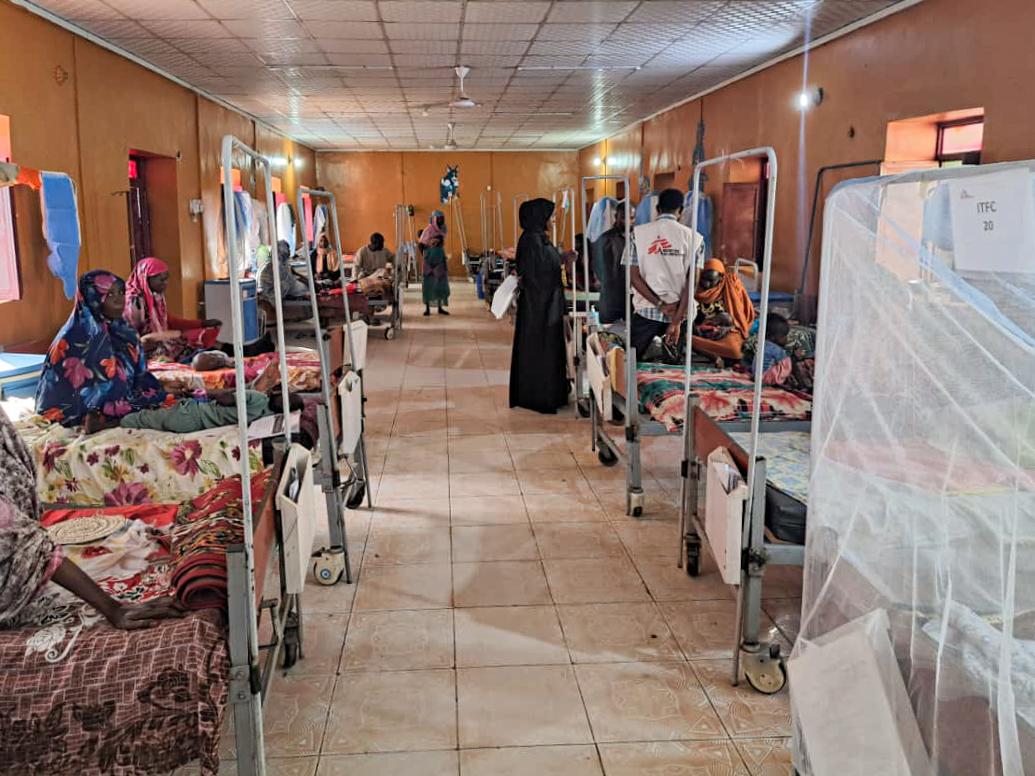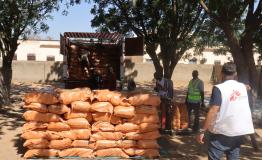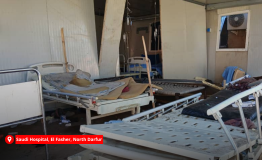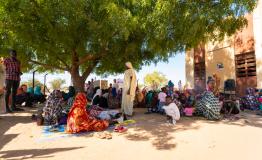A year has gone by, the needs are still there
In El-Geneina, the capital of West Darfur state near the eastern border with Chad, stands El-Geneina Teaching Hospital, the main tertiary and secondary healthcare facility. This central facility, which is a couple of hours' drive from Adré, serves local populations as well as displaced people, mostly women and children.
Despite being looted and out of service in the early weeks of the April 2023 war, it has remained the only hospital in the city, providing free lifesaving medical care to vulnerable populations, addressing the consequences of the last year’s mass violence and the continuous increase in humanitarian needs.
Around the same time last year, ethnically targeted violence in West Darfur led to two major massacres, horrific war injuries, sexual violence, and a massive exodus of people from El-Geneina into Eastern Chad. The UN High Commissioner for Human Rights condemned the violence and called for a thorough investigation and accountability. After been trapped in El-Geneina for two months, people managed to escape in June. As they flooded across the border, the MSF-supported hospital in Adré received over 800 war-wounded persons in just three days. Our teams provided lifesaving surgical activity and expanded inpatient care and medical services to cope with the mass arrivals of injured and vulnerable people.

Present Moment
Our team in El-Geneina Teaching Hospital has been providing crucial medical assistance, power, and water supplies, and rehabilitation to the premises, despite the evacuation of some staff in April last year. From January to May 2024, our team conducted approximately 23,000 outpatient consultations. In April and May alone, the hospital saw an 11 per cent increase in the number of patients compared to the first three months of this year. This increase coincides with the start of the ‘lean season’ and food insecurity.
The malnutrition situation in West Darfur, mirroring conditions in the greater Darfur state, remains critical.
"Data from MSF-supported paediatric outpatients and inpatients departments at El-Geneina Teaching Hospital show increased levels of severe acute malnutrition at an average of 5 per cent, moderate acute malnutrition at 16 per cent, and global acute malnutrition at 21 per cent, among children screened for acute malnutrition between January and May 2024," reports Dr Habib Baharldeen, MSF medical activity manager.
"The number of admissions to the inpatient therapeutic feeding centre has also doubled from January to April 2024. Initially, the hospital had 20 beds; this number was increased to 34 in mid-March and to 50 in April 2024,” Dr Baharldeen concluded.
In response to the increase, MSF launched community door-to-door malnutrition screening, as part of active case finding and treatment, for children aged 6-59 months (about five years). The number of children screened doubled in March and April compared to January and February, correlating with an increased number of outpatient department consultations.
The number of admissions to the inpatient therapeutic feeding centre has also doubled from January to April 2024. Initially, the hospital had 20 beds; this number was increased to 34 in mid-March and to 50 in April 2024.Dr Baharldeen
Invisible Wounds
The conflict has impacted MSF teams; some have evacuated and are working remotely, while many of those remaining have also been displaced. They are doing everything they can to keep activities running while ensuring their own safety and needs are met.
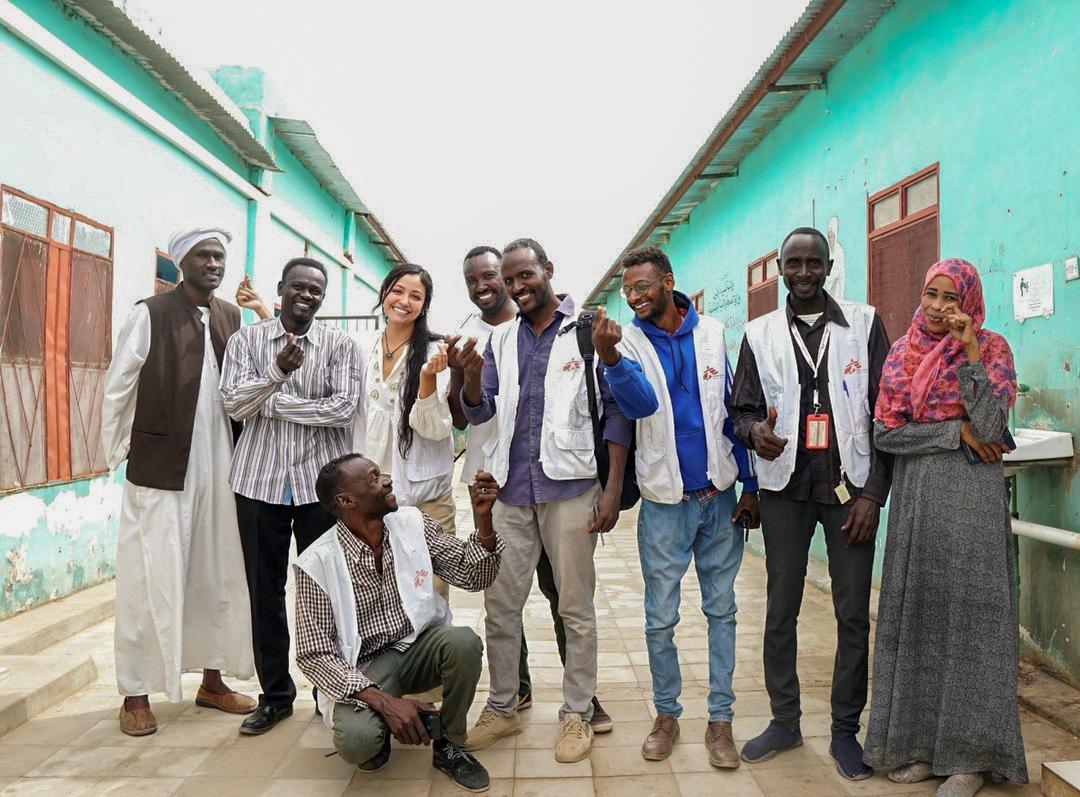
An MSF locally hired staff member (his identity is disguised) shared that in a single night he found himself navigating a dilemma as a civilian and humanitarian caught up in war and his duty to support people in need.
“It has been a year since the first massacre happened here in El-Geneina. The situation was disastrous due to horrific violence that severely restricted all movement.
There was a significant shortage of medical staff to provide emergency medical support to people, and I couldn't guarantee my own safety if I went outside my home.
At the war's start, El-Geneina Teaching Hospital was shut down as it was caught in the middle of these clashes. When the tension started to ease a bit, a local medical staff who remained in the city, convened a meeting to discuss reopening the hospital because of its vital importance to the community. Consequently, the decision was made to reopen it. By June 2023, I was working in my own capacity, and doing all I can, coordinating to keep parts of the hospital running, and when the MSF team managed to return and realized I was one of their staff, they appointed me as their focal person for many services. I never left. It is a duty.
Since I was a child in primary school, I have been passionate about humanitarian work. I am always passionate to respond to urgent needs. My hope for the future is to work abroad with MSF to serve people suffering from other crises. I believe in MSF’s global mission.”
Aisha Bilal is a health promoter with MSF who previously worked in El-Geneina Teaching Hospital and has now joined our team in Adré transit camp. She explains her role within the refugee community at the camp, emphasizing her commitment to enhancing health education and awareness among displaced populations.
“We had no choice but to flee because living conditions in El-Geneina had become unbearable. Since the start of the war in Sudan in April, it had been impossible to leave our house. We had to stay hidden, without water or food, and under constant threat. Even though living in a shelter in an unofficial camp in East Chad is not easy, we are grateful for the welcome at Adré transit camp and the presence of MSF.
At El-Geneina, I was already working as an awareness-raiser because I studied community development. So, I’m in my position as an MSF health promoter. My role is to help patients and medical teams understand each other. As a refugee myself, I have the same needs as all the people who come to the health center for treatment. In the morning, as soon as it opens, my outreach colleagues and I are in the triage tent to explain to the people waiting what medical services are available to them and the different stages of care.”
In the volatile contexts of wars and inter-communal violence, wounds are not only physical but also deeply etched mentally on the souls and minds of those affected. This impact extends to both the patients and the humanitarians working in these environmen
Cynthia Matildes, a psychologist with master's degrees in Family Therapy and Refugee Care, has been with MSF since 2019. She worked at El-Geneina Teaching Hospital three times—first in 2021, then in 2023, and most recently in 2024. She observed the invisible wounds inflicted on both patients and staff due to the violence in El-Geneina.
“Many of the people in Geneina are survivors of violence, whether it was inflicted directly on them, or on people close to them, or they witnessed it. While we cannot say that all these people are traumatized, we can speak of ‘potentially traumatic situations’, which make people more vulnerable and often have a negative impact on their mental health. These experiences do not exclude the local staff with whom MSF works, since beyond being health and humanitarian workers, they are part of the population affected by the armed conflict.
I think one of the things that has struck me the most is to have seen how the medical and non-medical staff at El-Geneina hospital kept working even during active conflict, doing it purely to help others, even risking their own lives. This to me truly speaks of what it is to be a humanitarian worker, and it is something I admire greatly.
Another thing that I have found amazing is the level of fortitude of the people of El-Geneina to overcome hardship and their ability to continue with their daily activities, even during uncertainty.”
At El-Geneina Teaching Hospital, mental health activities include psychological counselling for children and adults, recreational and psychosocial activities for malnourished children under five and their caregivers, and group educational sessions on mental health for all ages. A particular focus is on support for survivors of sexual violence, combining psychological and medical treatment.
These initiatives help reduce the exacerbation of symptoms and strengthen individuals' coping mechanisms. In regions affected by ethnic-based violence, it is imperative that people receive holistic healthcare. Remember, there is no health without mental health.
“Mental and psychosocial support is essential since health must be treated in a comprehensive way. We must remember that health is a state of well-being, and this includes psychological, emotional, and social health.
The problem is that many times social attention is not paid to mental and emotional symptoms or conditions, and it is not until we already see serious consequences or effects that people try to seek support. This is why many of our activities in El-Geneina and in general at MSF focus on prevention and education, in addition to treatment.”
Cynthia concluded: “Our teams always benefit from receiving mental health support, considering that there are different levels of support, and I am not necessarily talking about counseling or psychological therapy. I think at the end of the day an armed conflict like the one happening in Sudan has a major impact on people's lives, and having psychosocial and mental health support can help prevent normal reactions from turning into more severe symptoms. I can say without a doubt that our team in El-Geneina is highly motivated to continue with the activities in this project.”
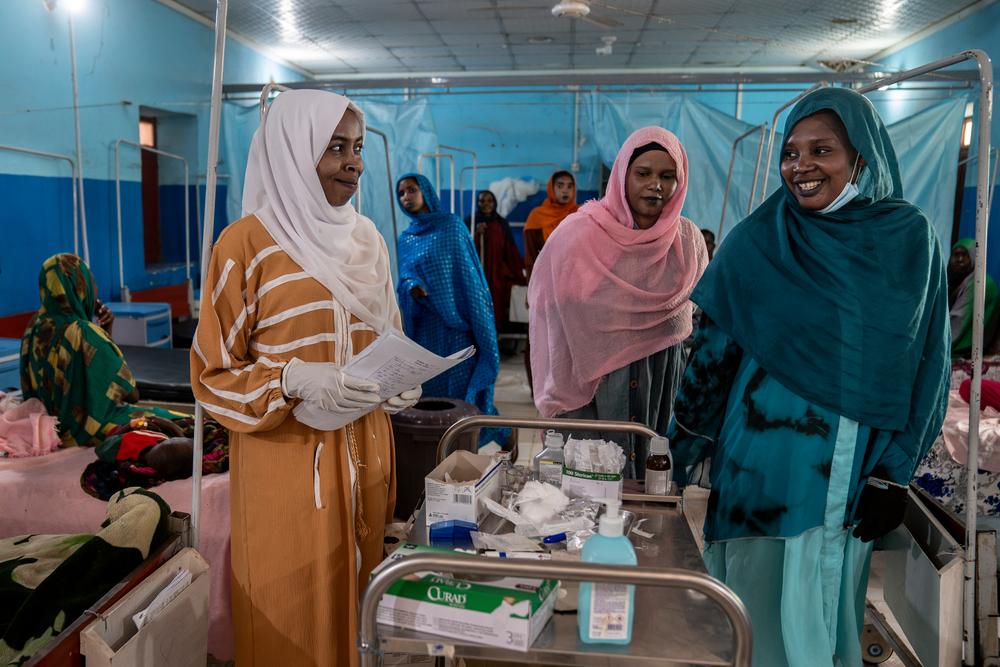
Outreach to the Communities
At El-Geneina hospital, we deliver a comprehensive package of paediatric care to both outpatients and inpatients and run an inpatient therapeutic feeding center for severely malnourished children. MSF also supports the Ministry of Health staff in the hospital through incentives so that they can sustain a range of medical services essential for addressing emergency healthcare.
In villages distant from El-Geneina, abandoned health facilities underscore the urgency of our mission. This lack of medical services prompted our team to conduct exploration assessments to extend medical support. In May 2024, our outreach team visited locations such as Jabal Moon, Sirba, Beida, Habila, and Fora Baranga, where we conducted nutritional screenings, treated severe malnutrition, assessed rural healthcare facilities, and distributed medical and nutritional supplies. This period marked an increase in consultations, admissions, and overall workload, likely due to the lean season and a spike in malnutrition cases.
People keep crossing the borders
Crossing the borders, over half a million Sudanese people, predominantly from Darfur and significantly from El-Geneina, have sought refuge in Eastern Chad. Since July last year, our teams have been responding to the refugee influx in camps like Adré transit camp, which alone hosts over 180,000 refugees (UN data in May 2024).
In Adré, MSF stands as the primary provider of water and sanitation, supplying 80 per cent of the camp's water needs. Our two clinics in the camp offer 300 to 500 daily consultations, with 53,748 from January to April. Services include vaccinations, specialized malnutrition treatment, sexual and reproductive health care, mental health consultations, and hepatitis E screening and treatment.
“The needs for Sudanese refugees are immense in Eastern Chad, with water, sanitation, shelter and food all in short supply. As with all emergencies, it’s key to prioritize. The priorities come from the medical and the hygiene and sanitation teams. However, starting to respond to a crisis requires everyone - medical staff, logisticians and administrators - to understand each other's challenges. This enables us to find solutions together as quickly and efficiently as possible. I often say to everyone: let's be aware of our limits and be realistic.”
Beatriz Martinez de la Fuente, former MSF project coordinator in Aboutengué camp where around 47,000 refugees settled.
The displacement from El-Geneina to Adré continues, driven not only by violence but also increasingly by severe food shortages. Many people cross into Adré seeking sustenance, water, and rest, some with the hope of returning to El-Geneina, while others remain to escape the dire conditions in the city.
A massive scale-up is needed
Nearly a year has passed since the violence and exodus from El-Geneina to Adré occurred. Since June 2024, another area of Darfur, El Fasher, is experiencing a violent turmoil, leading to displacement and loss of hundreds of lives. As the fighting between the two warring parties of Sudan continues to ravage El Fasher, the city’s hospitals are damaged and shut down. Meanwhile, thousands of people have been fleeing in search of safety, with many arriving at Zamzam camp, where there is already an acute malnutrition crisis.
For months, MSF has been the main health provider in most areas of Darfur with a total lack of international attention. Our activities in El-Geneina Teaching Hospital have extended into areas usually covered by UN agencies, such as providing water and power. MSF stepped into the limited response of others humanitarian partners. The question remains: till when?
